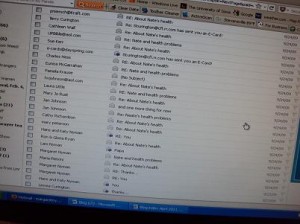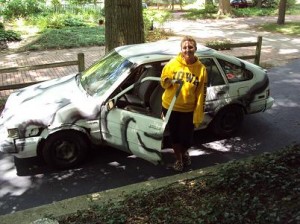This morning my neighbor showed me her unique key ring: a beach stone with a hole through it. She and her granddaughter collect these holey stones, and their finds have been lavish enough to create a long garland of them above her kitchen sink.
Often we think of holey things as being broken or deficient. For example, when our bones get holey, we have osteoporosis. Holey teeth mean cavities, which can lead to root canals and crowns. A hole-in-the-wall refers to a dingy, unimpressive room or apartment.
Just as often, though, holes can be positive: the holey sponge used to seal my slate floor; the holes in notebook paper used to anchor pages to a 3-ring binder; the holes in board games like Chinese Checkers or Parcheesi; holes in lace, handmade by skilled grandmas; a hole-in-one.
There’s also the category of holey items that were negative at one point but have now become positive, like holey jeans. Once considered ready for the rag bag, expensive jeans wear designer labels these days and are marked by well-placed, professionally cut holes.
Some holey things can’t be seen at all but are significant nonetheless: a hole in someone’s heart (sadness); a hole in my head (irrationality); an ace in the hole (hidden advantage); holes in an argument (unsound reasoning).
Worst of all, I think, would be holes in my thinking about the way to God, an inaccurate analysis of the way to have eternal life in heaven. To be wrong on this would be to suffer severe, never-ending consequences. We don’t want any holes in our thoughts about what comes after death. Happily, God doesn’t leave us guessing. In Scripture he details clearly the route to heaven:
1. Every one of us does wrong things, which are sins. (Romans 3:23)
2. Since a perfect God can’t live with sinners or their sins, we’re doomed without a way to get rid of them. (Romans 6:23)
3. That’s where Jesus comes in, having voluntarily sacrificed his flawless life for our sinful lives. (Romans 5:8)
4. When we admit we need his forgiveness, God cloaks us in Christ’s righteousness and saves us from eternal death. (Romans 10:13)
And that’s the unholey way to get to heaven.
After we’ve followed these steps, we can begin learning to live a life that is not holey (full-of-holes) but is, instead, holy. Not that it’s easy! But some good starting points are to choose impartiality over judgment, humility over arrogance, and forgiveness over vengeance.
Although none of us can do all of that, all of the time, we can all make an effort in those directions. And when we do, we’ll gain holiness a little bit at a time. And best of all, when we get to heaven we won’t need a key ring or a key to get in, because Jesus himself will open the door.
“What does the Lord require of you? To act justly and to love mercy and to walk humbly with your God.” (Micah 6:8)







